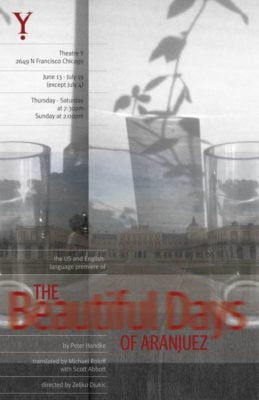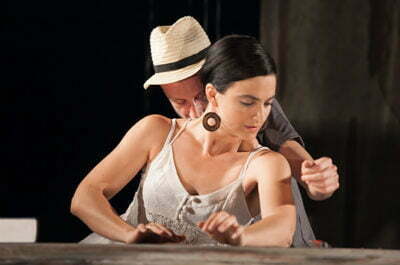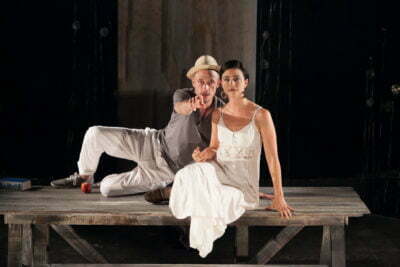The Beautiful Days of Aranjuez
By Peter Handke
Translated by Michael Roloff and Scott Abbott
Directed by Zeljko Djukic
Produced by Theatre-Y
European Eroticism as a Dramatic Happening
Part of the pleasure of Chicago theatre is the global menagerie of artistic influences that mingle here. Among many others, Eastern and Central Europe are represented by TUTA, co-founded by Bosnian Serb Zeljko Djukic, Trap Door Theatre, co-founded by Polish-American Beata Pilch, and Theatre Y, co-founded by Hungarian-American Melissa Lorraine. Now, Djukic and Lorraine are teaming up to present the English-language premiere of The Beautiful Days of Aranjuez, by acclaimed Austrian writer Peter Handke. Scheduled to become a movie in 2017, this script was written to resist normal expectations of drama, and instead uses poetry to explore the psychology of arousal between a man and a woman. The result is a distinctly European production, both in terms of content, and its relationship with an audience that is encouraged to apply their own histories while determining the dramatic discussion’s significance.

The Woman (Lorraine) and Man (Kevin V. Smith) are lounging outside, eating apples in the Spanish city of Aranjuez. They’re young, but not very young. Costume designer Natasha Vuchurovich has supplied Smith with a Panama hat that he manages to make look like his usual attire, and Lorraine with a breezy white dress and hoop earrings. As he sits cutting up an apple, the Man asks the Woman how she lost her virginity. She tells him a little about her first time, on a swing when she was very young, but is more interested in talking about a later encounter in a salt works facility. She won’t divulge much about her lovers, but she will talk about her feelings: how she felt reborn after her first time, and began developing idealistic expectations after the second despite how filthy it was.
So goes a dialogue that is described by the production as an “interrogation,” but lacks the hostility that word implies. The Man does call the Woman out on inconsistencies in her narrative and claimed principles, but Smith does so with a tone of amusement, and Lorraine’s character enjoys extemporaneously describing passions too much to force them into coherence. There is an implicit difference in tastes between the two lovers: she makes references to Tennessee Williams and medieval troubadours, he is fascinated by vegetables and was disappointed that the so-called “House of Rural Workers” in a royal park contained murals with romanticized images of peasants, instead of being fit for actual workers. He finds beauty in natural patterns, and when the Woman describes her attraction to power and revenge fantasies, he’s a little uncomfortable, even though her idea of a revenge fetish simply means living well.

Lorraine delivers her lines with conviction appropriate for how seriously the Woman takes her pleasure. Smith possesses a sense of wondering adoration in his poetic descriptions of much more mundane, simple kinds of beauty, but the script allows him to move much more energetically. The church attic that Theatre Y makes its home unfortunately swallows up some of the actors’ words, but they are complemented by Kimberly Sutton’s sound design, which endlessly provides animal noises and the hum of Spanish heat. Director Zeljko Djukic carefully balanced the two types of sound, so that the play would take on the quality of a hallucination, though again, that word has too negative a connotation. I’d say it’s more like a dream. I also noticed that I became much more interested in the characters’ discussion after about the first half hour, though I have no idea whether that was due to the performance or the script.
Handke’s writing is clearly translated from German. Everything the characters say is formal, and Smith’s, especially, speaks in long, complicated sentences. Which is not a bad thing; Handke’s writing demonstrates sophistication of artifice in a way that is much more mysterious than this conversation would likely have been if presented naturalistically. Seeing The Beautiful Days of Aranjuez is an experience which requires a certain mind-set to enjoy. Handke’s fans have called his writing deeply erotic precisely because he takes such an analytical approach to emotions. Every show is followed by a discussion in the church’s courtyard, and I encourage anyone attending to stay and listen. Besides appreciating Theatre-Y’s work more, you’ll experience the kind of bond between audience members and performers that the theatrical culture in this work’s place of origin thrives on.
Recommended
Jacob Davis
[email protected]
Reviewed June 25, 2015
For more information, see The Beautiful Days of Aranjuez’s page on Theatre in Chicago.
Playing at Theatre Y, 2649 N Francisco. Tickets are $20, with discounts for students, seniors, and industry. To order, visit Theatre-Y.com. Performances are Thursdays-Saturdays at 7:30 pm and Sundays at 2:00 pm through July 19. Running time is eighty minutes with no intermission.
